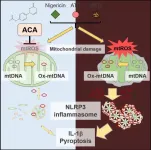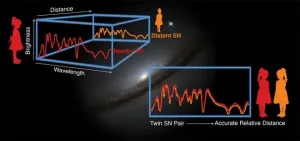INFORMATION:
The paper, published in the journal Appetite, is entitled: "Meat disgust is negatively associated with meat intake - evidence from a cross-sectional and longitudinal study."
Some meat eaters disgusted by meat
2021-05-07
(Press-News.org) Some meat eaters feel disgusted by meat, according to a new study.
University of Exeter scientists showed food pictures to more than 700 people, including omnivores (who eat meat and other foods), flexitarians (who try to eat less meat) and vegetarians.
About 7% of meat eaters (15% of flexitarians and 3% of omnivores) had a "fairly strong disgust response" to images of meat dishes commonly eaten in the UK, like roast chicken or bacon.
As a group, omnivores rated meat images about twice as disgusting on average as pictures of carbohydrate-rich foods like bread, chips and rice.
Based on the findings, the researchers say harnessing the "yuk factor" may be more effective than relying on willpower for anyone who wants to eat less meat.
"We were surprised to find that so many people are grossed out by meat - even people who eat meat all the time," said Elisa Becker, of the University of Exeter.
"Our results don't explain why these people eat meat, but it's possible that habits, family and cultural traditions all play a part.
"Meat consumption is increasingly seen as unsustainable, unhealthy and unethical, and many people want to eat less meat.
"If you're trying to cut down your meat intake, sheer willpower may not be enough - but harnessing the 'yuk factor' could be the way to go."
The study's 711 participants - 402 omnivores, 203 flexitarians and 106 vegetarians - each completed a survey and took a rapid-response task (measuring instinctive reactions) to test their levels of "meat disgust".
"Meat liking" was also measured. About 75% of omnivores - and more than 20% of vegetarians - showed a fairly strong liking for meat.
To be classified as having "fairly strong" meat disgust, participants had to rate six meat images closer to "very much" than "not at all" on a sliding scale of disgust, and also had to show evidence of meat disgust on the rapid-response task.
Among flexitarians - the only group attempting to reduce their meat intake - meat disgust was a better predictor than self-control (measured in a separate questionnaire) of reduced meat-eating.
Meat disgust was also associated with reduced intake over the following six months.
"We hope that this information can help us develop new interventions to help people reduce their meat intake," said Professor Natalia Lawrence, of the University of Exeter.
"Not everyone wants to reduce their meat consumption - but for those who do, we are working on computer tasks that might help them harness the power of disgust in a fun way.
"It's important to note that our study does not establish causation - so further research is needed to find out whether meat disgust causes people to eat less meat, or whether avoiding meat allows these negative emotional responses to develop or be expressed."
Becker added: "It's interesting to note that almost all of us experience meat disgust from time to time - for example when we see unfamiliar meats or dishes made from parts of animals we don't usually eat, like squirrel meat or beef heart.
"Humans may have evolved a degree of meat disgust because eating spoilt meat can be much more dangerous than eating a carrot that's a bit off."
ELSE PRESS RELEASES FROM THIS DATE:
Tropical ginger treatment for blocking inflammation
2021-05-07
Ikoma, Japan - Many natural compounds have various anti-inflammatory and other beneficial properties that humans have been utilizing for medicinal purposes for hundreds of years. However, the specific molecular mechanisms behind these health-promoting effects are not always clear. One such compound is 1'-acetoxychavicol acetate, or ACA, which comes from the tropical ginger Alpinia plant. Now, researchers from Nara Institute of Science and Technology (NAIST) have identified how ACA can help in the treatment of inflammatory diseases.
In a report published in International Immunology, they found that ACA attenuates mitochondrial damage through decreasing mitochondrial reactive oxygen species (ROS), blocking ...
Small apoptotic bodies: Nirvana, birth and death
2021-05-07
Scientists from Nanjing University and University of Macau have discovered nano-scaled apoptotic bodies (ABs) as a new brain-targeting drug carrier, bringing new promise for the Parkinson's Disease as well as other brain diseases.
The blood-brain barrier (BBB) is the most restrictive barrier that keeps most biomolecules and drugs from the brain, setting "barriers" for the treatment of cerebrovascular diseases. With the increasingly serious ageing problem, the treatment of brain diseases now faces tough challenges, and therefore efficient brain drug delivery ...
Supernovae twins open up new possibilities for precision cosmology
2021-05-07
Cosmologists have found a way to double the accuracy of measuring distances to supernova explosions - one of their tried-and-true tools for studying the mysterious dark energy that is making the universe expand faster and faster. The results from the Nearby Supernova Factory (SNfactory) collaboration, led by Greg Aldering of the Department of Energy's Lawrence Berkeley National Laboratory (Berkeley Lab), will enable scientists to study dark energy with greatly improved precision and accuracy, and provide a powerful crosscheck of the technique across vast distances ...
Researchers develop artificial intelligence that can detect sarcasm in social media
2021-05-07
Computer science researchers at the University of Central Florida have developed a sarcasm detector.
Social media has become a dominant form of communication for individuals, and for companies looking to market and sell their products and services. Properly understanding and responding to customer feedback on Twitter, Facebook and other social media platforms is critical for success, but it is incredibly labor intensive.
That's where sentiment analysis comes in. The term refers to the automated process of identifying the emotion -- either positive, negative or neutral -- associated with text. While ...
Having a ball: New English Premier League soccer ball more stable, drags more
2021-05-07
Tsukuba, Japan - Scientists from the Faculty of Health and Sports Sciences at the University of Tsukuba used aerodynamics experiments to empirically test the flight properties of a new four-panel soccer ball adopted by the English Premier League this year. Based on projectile and wind-tunnel data, they computed the drag and side forces and found that the new ball was marginally more stable than previous versions but may not fly as far. This work may help improve the design of future sports equipment.
Sports players know that millions of dollars in salary and potential endorsement deals can be at stake during each match. Soccer players often complain about the aerodynamic ...
Winning gene combination takes all
2021-05-07
Researchers have traced the remaining last steps of the biological pathway that gives oats resistance to the deadly crop disease take-all.
The discovery creates opportunities for new ways of defending wheat and other cereals against the soil-borne root disease.
The research team have already taken the first step in this aim by successfully reconstituting the self-defence system in the model plant Nicotiana benthamiana.
Further experiments to establish the avenacin biosynthetic pathway in wheat's more complex genome, to test if it will provide the same resistance ...
Hologram experts can now create real-life images that move in the air
2021-05-07
They may be tiny weapons, but Brigham Young University's holography research group has figured out how to create lightsabers -- green for Yoda and red for Darth Vader, naturally -- with actual luminous beams rising from them.
Inspired by the displays of science fiction, the researchers have also engineered battles between equally small versions of the Starship Enterprise and a Klingon Battle Cruiser that incorporate photon torpedoes launching and striking the enemy vessel that you can see with the naked eye.
"What you're seeing in the scenes we create is real; there is nothing computer generated about them," said lead researcher Dan Smalley, a professor of electrical engineering at BYU. "This is not like the movies, where the lightsabers ...
Navigating the COVID-19 crisis to prevent pressure injuries: Learning health system helped one hospital adapt and update care in real time
2021-05-07
May 7, 2021 - Early in the COVID-19 pandemic, healthcare systems scrambled to modify patient care processes - particularly when it came to strategies aimed at reducing the risk of hospital-related complications. A look at how one hospital applied its learning health system (LHS) framework to respond to a COVID-19-related increase in hospital-acquired pressure injuries (HAPIs) is presented in the May/June Journal for Healthcare Quality (JHQ), the peer-reviewed journal of the National Association for Healthcare Quality (NAHQ). The journal is published in the Lippincott portfolio by Wolters Kluwer.
"Given the significant challenges ...
Cutting-edge: New and improved drug to counter spinal anesthesia blues during C-sections
2021-05-07
Today, deliveries via cesarean sections, or c-sections, have become quite common globally. Sometimes, c-sections are a medical necessity when normal deliveries become risky either for the mother or the baby. At other times, it can be a choice. C-sections today have become a considerably safer procedure than it was a few decades ago, but there is need to refine it further.
In a END ...
New study determines cystic fibrosis therapy is safe and effective for young children
2021-05-07
Children ages two to five who have the most common form of cystic fibrosis (CF), caused by two copies of the F508 gene mutation, have not had any modulator treatments available to them until recently. A new study authored by researchers at Children's Hospital Colorado and published May 6, 2021, in Lancet Respiratory Medicine shows that the CFTR modulator - lumacaftor/ivacaftor - can be safe and well-tolerated for this age range for up to 120 weeks, allowing younger children to begin proactive treatment of CF earlier in their lives.
CF affects more than 70,000 people worldwide and is a chronic, progressive, life-shortening genetic disease caused by an absent or defective protein called the CF transmembrane conductance regulator (CFTR) protein, resulting from mutations in both copies ...







